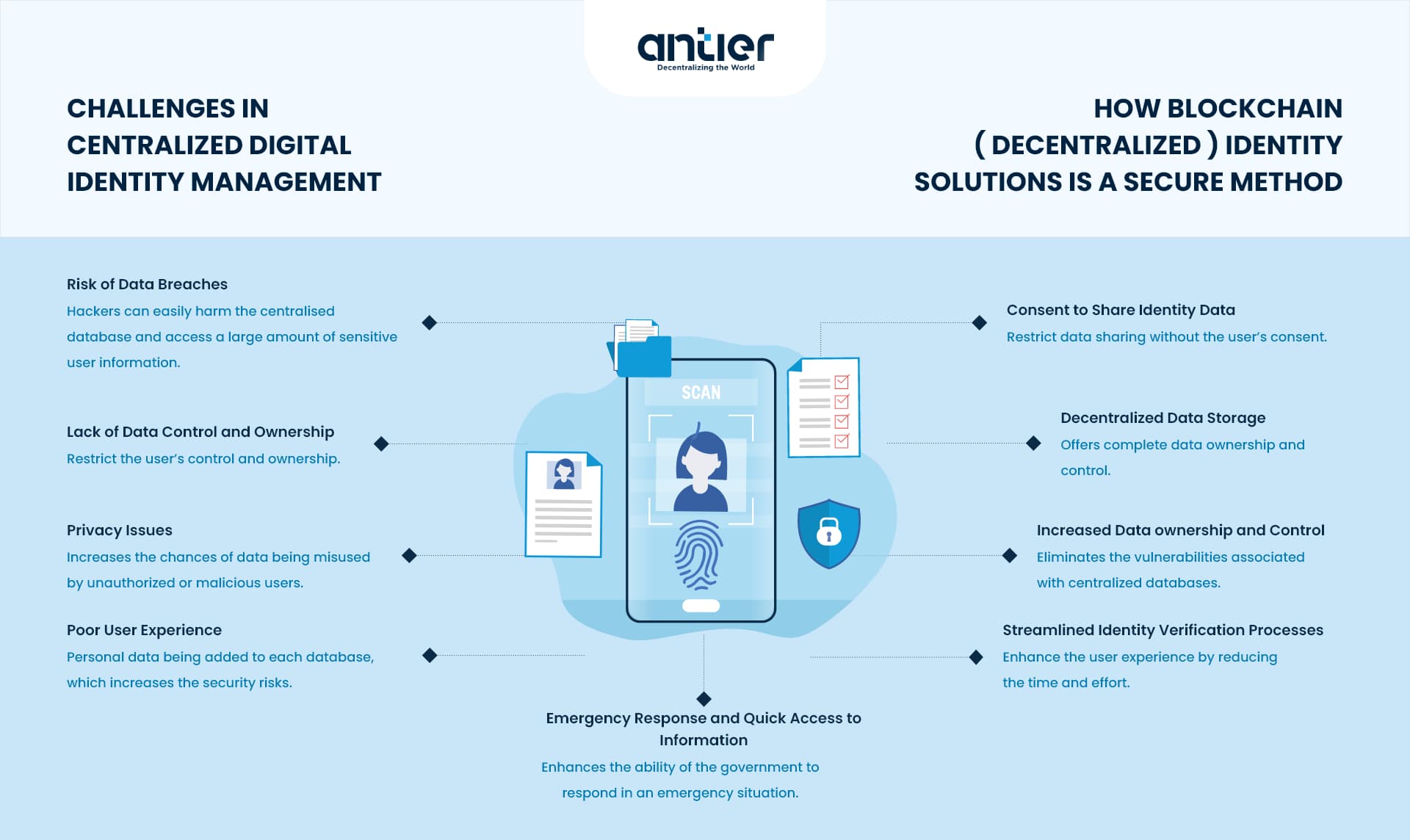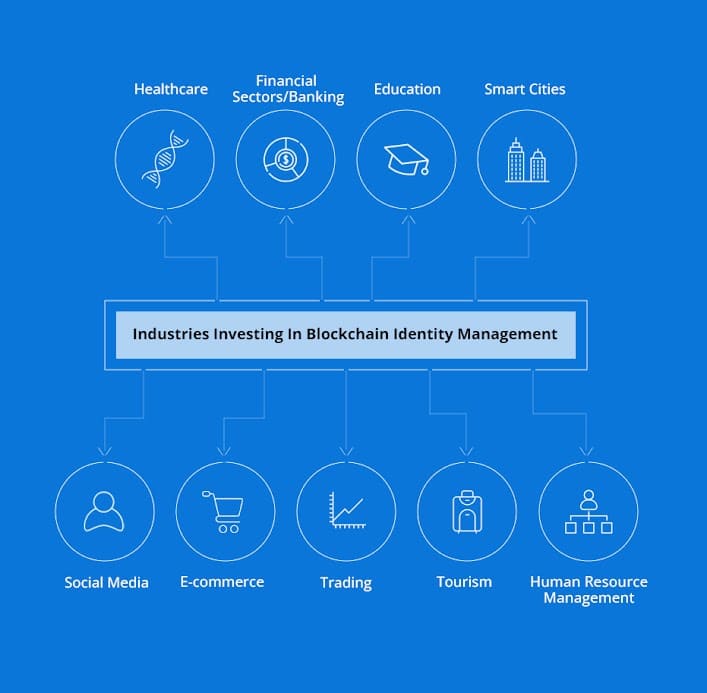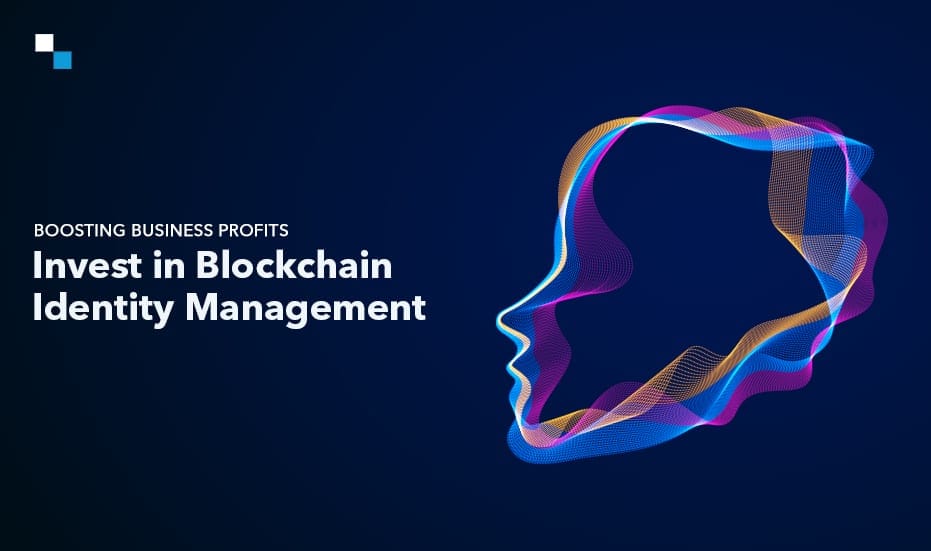
NFT Gaming Trends 2024 and Beyond
January 18, 2024
Focus on Trading & Security Features of Decentralized Exchange Software in 2024
January 18, 2024As industries globally embrace digital transformation, the blockchain identity management market stands as a pivotal force. In an era where organizations digitize operations and engage online, the demand for tamper-proof identity verification intensifies. The market’s meteoric rise is fueled by a growing appetite for secure and decentralized identity solutions, with blockchain technology at its core, delivering a fool-proof and transparent system that liberates us from the constraints of centralized authorities.
This article delves into the dynamic landscape of the blockchain identity management market, along with its features, benefits, business contributors, future outlook, and much more.
Current Market Trend: Blockchain Identity Management
The global market for blockchain identity management is forecasted to attain USD 34.94 billion by 2030, with an expected compound annual growth rate of 82.6% from 2023 to 2030.
The Blockchain Identity Management market is a dynamic and swiftly evolving space marked by intense competition. Numerous players, ranging from industry giants to pioneering startups, are engaged in fierce competition for market dominance. This robust rivalry anticipates a continuous drive for innovation, superior product quality, strategic pricing, and elevated customer satisfaction.
Market dynamics are influenced by technological breakthroughs, regulatory shifts, and changing consumer preferences. This dynamic competition is not only fueling market expansion but is also presenting challenges and opportunities, prompting strategic collaborations, consolidations, and acquisitions. In essence, the blockchain identity management market is an intriguing arena of competition, where adaptability and innovative thinking are pivotal for success, particularly in maximizing business profits in the upcoming year.

Key Features: Blockchain-Based Identity Management Systems
Blockchain in identity management—a tech wonderland where data is secure, transparent, and beyond tampering. From shared databases to foolproof cryptography, explore the simple yet powerful features shaping this realm. Let us scroll down to have a clear understanding of the characteristics of a digital identity solution based on blockchain-
- Decentralization and Distributed Ledger- Allowing every network computer access to a shared database, ensuring transparency and preventing a single point of failure. Transactions require a majority consensus for validation.
- Tamper-Resistance- Once recorded on the ledger, blockchain data is immutable, maintaining the integrity and unalterability of information. This feature establishes trust among stakeholders.
- High Security with Cryptography- Employing cryptographic techniques to process and store transactions securely. Personally identifiable information is not stored on the blockchain, enhancing overall security.
- Transparency and Auditable Data- Providing a transparent and traceable record of transactions accessible to all network participants. This auditable trail ensures accountability.
- Privacy and Consent Empowerment- Enabling users to store and control access to their data. Blockchain facilitates data verification without revealing unnecessary personal details, aligning with privacy regulations.
- Consensus for Identity Data Integrity- Utilizing consensus mechanisms to validate transactions and govern the blockchain. This prevents inaccurate or fraudulent information from being added to the blockchain, ensuring data integrity.
Pain Points of Traditional Identity Management Systems in Businesses
A digital identity comprises a wealth of information about individuals or organizations existing online—usernames, purchase history, ID numbers, and search records. Historically governed by centralized and federated identity systems, these digital footprints face growing business risks amid global privacy regulations. Let us check out the various challenges faced by the businesses following traditional identity management systems in their operations-
Security Concerns
- Data Breaches- Centralized databases are vulnerable to hacking, leading to potential data breaches and identity theft.
- Fraud Risk- Traditional systems may lack robust authentication methods, making them susceptible to fraud.
- Lack of Interoperability- Fragmented Systems- Many businesses use multiple identity solutions, leading to interoperability issues and complexities in managing diverse systems.
Privacy Issues
- Excessive Data Collection- Some systems may collect more data than necessary, raising privacy concerns and regulatory compliance challenges.
- Lack of User Control- Users may not have sufficient control over their personal information, leading to potential misuse.
- Inefficient Processes- Slow Verification: Manual identity verification processes can be time-consuming, impacting the user experience and operational efficiency.
- High Costs- Traditional identity management systems may involve high operational and maintenance costs.
Identity Theft and Fraud
- Phishing Attacks- Users can fall victim to phishing attacks, compromising their login credentials and leading to unauthorized access.
- Social Engineering– Manipulation of individuals to disclose confidential information poses a persistent threat.
- Limited Scalability- Struggles with Growth: As businesses expand, traditional systems may struggle to scale, resulting in performance issues and downtimes.
Regulatory Compliance
- Ever-changing Regulations: Keeping up with evolving data protection and privacy regulations globally can be challenging and may result in non-compliance risks.
User Experience Challenges
- Cumbersome Processes- Cumbersome onboarding and verification processes can lead to a poor user experience, affecting customer satisfaction.
- Password Fatigue- Users may struggle with multiple passwords, leading to security risks or forgotten credentials.
Addressing these challenges requires businesses to explore innovative solutions, such as blockchain-based identity management, to enhance security, privacy, and overall efficiency in digital identity management. Thus, it is recommended to get in touch with an experienced company to design robust, extensive, and tamper-proof blockchain identity solutions.
How Does Blockchain Identification Help Businesses Maximize Profits?
Who are you?” holds myriad perspectives in the diverse world, where individuals navigate multiple identities to fit into various social groups. Amid this chaos, blockchain emerges as a weapon of recovery, standing firm on privacy through its decentralized, and immutable approach, ensuring high-security standards. It also allows businesses to maximize profits.

Explore the various ways how businesses can generate profits by leveraging blockchain identity management platforms through several key strategies-
- Enhanced Security- Blockchain Identity Management ensures a secure and tamper-resistant system, reducing the risk of data breaches and fraud. This, in turn, protects sensitive information, fostering trust among customers and partners.
- Streamlined Processes- The decentralized and transparent nature of blockchain simplifies identity verification processes. Businesses can save time and resources by automating KYC (Know Your Customer) procedures and onboarding, leading to increased operational efficiency.
- Cost Reduction- Blockchain eliminates the need for intermediaries in identity verification, reducing associated costs. Businesses can save on manual verification processes and paperwork, directing those resources toward revenue-generating activities.
- Improved Customer Experience- Swift and secure identity verification processes enhance the overall customer experience. This can lead to increased customer satisfaction, loyalty, and repeat business, ultimately impacting the bottom line positively.
- Global Accessibility- Blockchain-based identity solutions offer a decentralized and globally accessible platform. Businesses can expand their reach, targeting international markets more effectively and attracting a broader customer base.
- Compliance and Trust- Blockchain provides an immutable and auditable record of transactions, ensuring compliance with regulatory requirements. This builds trust with customers and partners, potentially attracting more business opportunities.
- Tokenization and Monetization- Blockchain identity platforms can facilitate the creation of digital tokens or assets tied to individuals. Businesses can explore new revenue streams through tokenization, creating innovative products and services.
Businesses can optimize and streamline their operations, enhance security, and foster trust by using blockchain for identity management which ultimately leads to increased profitability and a competitive edge in the market.
Top Sectors Investing in Blockchain for Identity Management
Various sectors or industries have been mass-hiring blockchain identity services for better security and privacy. From healthcare’s guarded patient data to finance’s fortified KYC, each sector has leveraged the potential of blockchain in identity management, facilitating seamless interaction. Here is the list of the top sectors that have been massively adopting digital identity platforms-

- Healthcare- Employing blockchain identity management for secure patient data access, enhancing interoperability among healthcare providers.
- Financial Sectors/Banking- Implementing blockchain to streamline KYC processes, reducing fraud risks and ensuring secure customer identity verification.
- Education- Enhancing credential verification and student identity management through blockchain, ensuring academic integrity and reducing fraud.
- Smart Cities- Utilizing blockchain for secure and interoperable citizen identity solutions, facilitating seamless access to city services.
- Social Media- Integrating blockchain identity management to enhance user privacy and security, giving individuals more control over their data.
- E-commerce- Improving customer authentication and transaction security with blockchain identity solutions, fostering trust in online transactions.
- Trading- Leveraging blockchain for secure and transparent supply chain identity management, reducing fraud, and ensuring product authenticity.
- Tourism- Enhancing traveler identity verification, border control processes, and secure sharing of travel information through blockchain.
- Human Resource Management- Streamlining employee onboarding, identity verification, and access control using blockchain for efficient and secure HR processes.

Looking at these collective adoptions underscores the universal acknowledgment of blockchain’s transformative impact across diverse industries. Tieing up with a profound blockchain identity management company helps you create exceptional solutions that can help individuals or businesses secure, manage, and verify sensitive data.
Future Outlook: Blockchain-Based Identity Management Systems
The horizon for blockchain-based identity management systems appears bright, poised to reach a valuation of 17.81 billion by 2030. As per reports, the market’s expansion is driven by global governmental initiatives with a compelling compound annual growth rate of 56.60% from 2022 to 2030. However, if we talk about regional growth, currently, North America leads the charge, propelled by advanced infrastructure and a rising demand for robust data security. As industries increasingly adopt digitization, blockchain-based identity management systems stand as a pivotal solution against the mounting threats of data breaches and cyber attacks, promising a secure and resilient future.
Invest In The Benefits? Consult Blockchain Identity Management Firm
Investing in blockchain-based identity management systems is a good idea for streamlining your business operations, as it helps maintain the authenticity of your brand. Integrating blockchain in digital identities opens up a wide range of opportunities, leading to high revenue generation. Apart from this, it also boosts trust among consumers or customers about their data safety and privacy.
Are you planning to invest in the same? Well, if yes, then you must collaborate with Antier. We are a leading blockchain firm specializing in delivering exceptional blockchain identity management systems. Our company boasts highly qualified and experienced blockchain professionals who are well-versed in designing secure solutions on popular or trending blockchain networks. We leverage our mere expertise in blockchain technology to craft the finest solutions.



